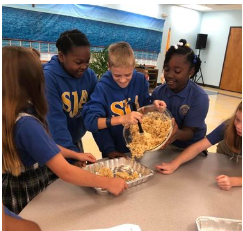
St. Joseph Academy families have launched an effort to save the school, where 78 of 162 K-8 students participated in the Florida Tax Credit Scholarship or Family Empowerment Scholarship programs for lower-income students.
An 82-year-old Catholic school in Florida has abruptly announced its closure, another telling sign that COVID-19 is eroding the financial ground beneath private schools.
At the beginning of the school year, the Catholic Diocese of Orlando had been discussing the possibility of revamping the St. Joseph Academy in Lakeland, Florida, a half-hour east of Tampa. But in a letter to parents Friday, the Very Rev. Timothy LaBo, pastor of St. Joseph Church, said the financial devastation wrought by the pandemic quickly led to a “serious impact on our re-enrollment numbers.”
“What we could not have imagined was the COVID-19 pandemic and its effect upon our world in such a short time,” LaBo wrote in the letter obtained by Lakeland Now.
The closure of the K-8 school shocked St. Joseph parents, who immediately launched an effort to save the school. But it’s not a surprise to those watching private schools across America struggle as parents lose jobs, businesses close and charitable contributions evaporate.
A survey by Step Up For Students, the nonprofit scholarship funding organization that hosts this blog, found 73 percent of Florida private schools said they are experiencing declines in re-enrollment last year, and 58 percent said they’re worried about their viability for the coming school year. The research and advocacy group EdChoice got similar results when it surveyed private schools nationwide last month. More than 20 million Americans lost their jobs in April, including 893,000 in Florida.
The Sunshine State has one of the biggest private school sectors in the country, and some of the nation’s biggest school choice programs. But those programs are primarily for lower-income students and students with special needs. It remains to be seen how much they will help private schools trying to retain working-class and middle-class parents who may be forced, in coming months, to make agonizing decisions about their children’s educations.
Seventy-eight of St. Joseph Academy’s 162 K-8 students used the Florida Tax Credit Scholarship or Family Empowerment Scholarship for lower-income students, while 26 used the Gardiner Scholarship or McKay Scholarship for students with special needs. (The FTC, FES and Gardiner programs are administered by nonprofits like Step Up.)
To date, the most meaningful government relief for private schools has come from the Paycheck Protection Program, which offer a two-month respite for small businesses and nonprofits. Other federal relief streams for education are aimed primarily at public schools, and attempts to steer a more equitable share to private schools has met with relentless pushback.
Other potential remedies, including the possibility of temporary tuition tax credits, have so far generated little debate. Likewise for the potential negative impacts on public schools, which will likely have to absorb former private school students in the face of massive financial and logistical challenges.